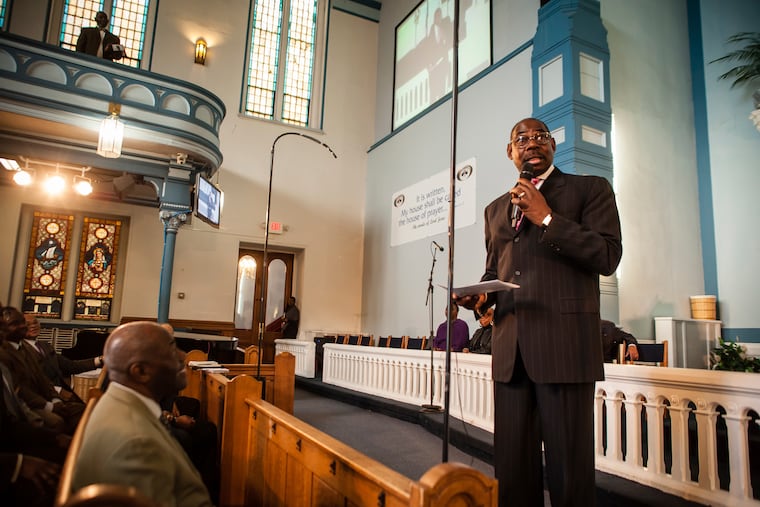The Rev. Herb Lusk, former Eagles player, team chaplain, and pastor, has died: ‘The end zone became my pulpit’
Pastor Lusk was the first NFL player to pray in the end zone after scoring a touchdown. He would later resume his Eagles career — as chaplain.

The Rev. Herbert Lusk II, 69, the outspoken longtime pastor of Greater Exodus Baptist Church and the former Philadelphia Eagle who gained national attention when he became the first NFL player to kneel in prayer in the end zone after scoring a touchdown, died Monday of cancer at his home in Philadelphia’s Society Hill neighborhood.
“The end zone became my pulpit,” Pastor Lusk would recall later of his end-zone gesture before 48,000 fans — which would become commonplace — after his 70-yard touchdown run in 1977.
Pastor Lusk later would resume his Eagles career — as team chaplain. But while he gained fame on the field, his NFL playing career was more or less a parenthesis in his life, said those who knew him.
“People talk about running backs, quarterbacks having vision of the field,” said former Eagles star Reggie Wilkes, who joined the team in 1978, Pastor Lusk’s final season. “He had a vision of life.”
Said U.S. Rep. Dwight Evans (D. Pa.), whose politics were quite different from those of Pastor Lusk: “He was just a good, spiritual person. He was really an asset to Philadelphia and the nation.”
“North Philadelphia and our city lost a true friend,” said City Council President Darrell L. Clarke in a statement.
Pastor Lusk played for the Eagles for three years that coincided with a period of ascendancy for an Eagles franchise that had been in disarray. When his career ended, “the Praying Tailback” pursued his ministerial calling. He entered a seminary and became pastor at Greater Exodus on North Broad Street in 1982.
He became a “giant” among Philadelphia’s Black clergy, said the Rev. Mark Tyler, pastor of Mother Bethel Methodist Church AME, in Center City.
Before Pastor Lusk joined Greater Exodus, the church evidently had experienced an exodus of its own. It was said to be in near bankruptcy with only 18 active members. Under his stewardship the congregation would swell to more than 2,000. Pastor Lusk also was the founder of People for People, an economic-development and job-training center.
“That gave a lot of people an opportunity for employment,” said the Rev. Alyn E. Waller, senior pastor of the Enon Tabernacle Baptist Church, the city’s largest Black church. “He really understood the role of the church as an economic driver.”
Said Wilkes, “I respect him most for his commitment to North Philly, where he built his church — the sheer energy that he maintained all those years to bring something good into the world.”
» READ MORE: Mr. Lusk defended his political conservatism
Pastor Lusk, a Republican and an antiabortion activist, wasn’t one to avoid controversy and was critical of Black people who criticized him for his political conservatism. “I think that’s foolishness and I think it’s unfortunate,” Pastor Lusk told The Inquirer’s Jenice Armstrong in 2017. That same year, he received the Pennsylvania Pro-Life Federation’s Lifetime Achievement Award.
“Politically, we’re completely opposite,” said Tyler, “but we have that common ground of being Black clergy persons.
“It reminds me of how it used to be, the way Democrats and Republicans would differ,” he added. “They didn’t have to vilify each other.”
Said Randy Robinson, an influential Black Republican: “He engaged with people in politics on his terms. Sometimes people have difficulty accepting that dynamic from an African American.”
Tyler said he first met Pastor Lusk after they clashed over the latter’s plan to hold in-person Easter services in April 2020, during the onset of the COVID-19 pandemic. Tyler was among those who implored Pastor Lusk to change his mind, which he did eventually.
“He actually listened to me,” Tyler said. “He felt my argument was compelling.”
He learned several weeks ago that Pastor Lusk was suffering from cancer. Pastor Lusk informed Tyler that he expected to die soon, and said, “‘I’m OK with that.’”
“I have nothing but admiration for him,” said Tyler.
Pastor Lusk, who was born in Memphis, Tenn., played college football at Long Beach State and was drafted in the 10th round by the Eagles in 1976. In his three years with the team he scored three touchdowns, with that most-famous one occurring against the New York Giants on Sept. 8, 1977, before more than 48,000 fans at Giants Stadium.
After leaving the team he obtained a master’s of divinity from the Reformed Episcopal Theological Seminary.
He is survived by his wife, Vickey; two daughters, Danuelle Cedrick and Laiah David; a son, Herbert III; and three grandsons.
Funeral arrangements were pending, the family said.
Inquirer columnist Jenice Armstrong contributed to this article.